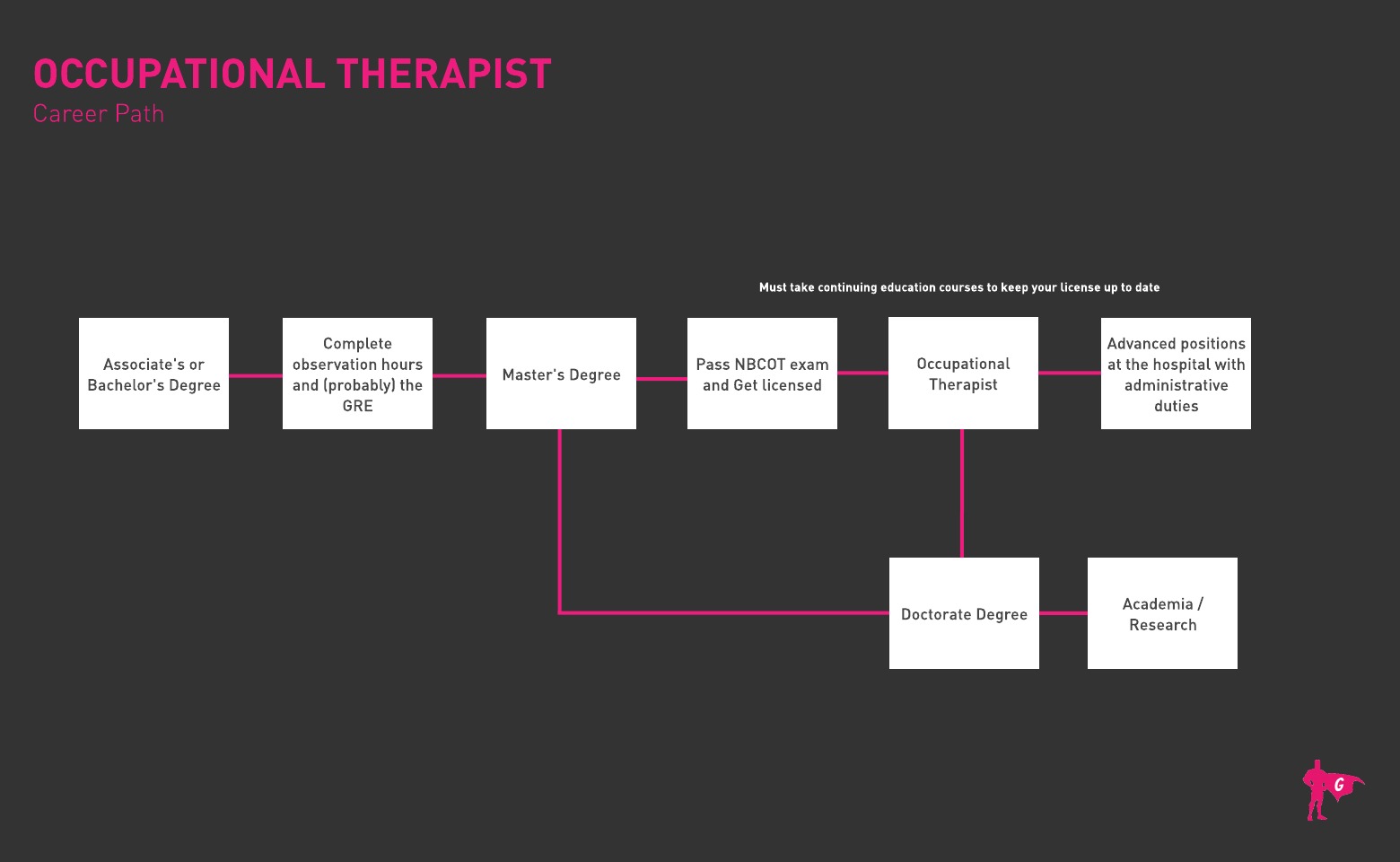Spotlights
An “occupational therapist” is also referred to as an “assistive technology trainer,” “Rehabilitation supervisor,” or “Rehabilitation consultant.”
Assistive Technology Trainer, Certified Hand Therapist (CHT), Early Intervention Occupational Therapist, Home Health Occupational Therapist, Industrial Rehabilitation Consultant, Occupational Therapist (OT), Pediatric Occupational Therapist (Pediatric OT), Pediatrics and Acute Care Occupational Therapist, Registered Occupational Therapist (OTR)
An occupational therapist works with patients who need help performing every day activities. These may be people with injuries, or individuals with developmental delays and disabilities. Sometimes, they are able to help a patient recover from an injury. Other times, they teach patients to make accommodations for permanent changes to their bodies.
Occupational Therapists work with the young, middle-aged, and elderly so they can lead independent lives as much as possible. They assess an individual’s needs and create independent plans for each person. While much of an Occupational Therapist’s work is physical, they also may work with people suffering mental health issues.
- Helping people live a fulfilling and independent life.
- Working with individuals to problem solve.
- Inspiring people who may be at their lowest point.
- There is a great need for the position.
An Occupational Therapist is a full-time position, typically for a hospital or health clinic. They will often work indoors at a clinic, but may travel for specific patient needs. It is possible to have a typical 9-5 schedule, but many therapists work nights and weekends to accommodate their patients’ lives.
Specific tasks with patients will depend on the Therapist’s specialty. They may spend their therapy time helping someone to walk, another person to write their name, or how to use a device such as a wheelchair.
Some therapists may teach individuals how to create a budget, manage their time, or perform house chores. Regardless of the specifics, they will work with the patient and their caretakers to develop an individualized plan.
In a typical day (or week), an Occupational Therapist will:
- Meet with a patient, their caregivers, and their physicians to develop an initial plan, and revise previous plans based on patient progress.
- Demonstrate exercises, teach a skill, or demonstrate equipment for a patient need.
- Assess a living situation and advise a family how best to accommodate an individual’s special needs.
- Meet with a patient family to help them understand their role in the patient’s therapy and new life.
- Work through evaluations, billing questions, and healthcare provider communication – including insurance questions.
- Occupational Therapy can involve a lot of hands-on therapy with patients. Therapists are often on their feet and moving quite a bit during a work day. It is a physically and emotionally demanding career.
Kỹ năng mềm
- Strong written and oral communication skills, especially active listening.
- Patience and willingness to inspire hope.
- Service-based outlook on life, actively looking for ways to help.
- Critical Thinking and Decision Making
Kỹ năng kỹ thuật
- Use of computers, including word processing, database entry, and spreadsheet software (Such as Microsoft Office)
- Use of site-specific billing and patient database software.
- Use of therapeutic and counselling principles and methods.
- Bệnh viện
- Therapy offices or clinics.
- Educational Organizations such as K-12 schools, colleges, or similar.
- Home healthcare services.
- Nursing or assisted living facilities.
Becoming an Occupational Therapist involves working through a Master’s degree. In order to be accepted into most programs, you will need to show volunteering time in occupational therapy programs, as well as having done well in your Bachelor’s program. While there are some programs that can combine the Bachelor’s and Masters programs, you can expect to be in school from Freshman year to the end of Graduate School for up to 7 years.
These programs involve at least 24 weeks of supervised fieldwork during your master’s program. This can involve very long, flexible hours. Many occupational therapists will realize during this time if the field is a place they want to work.
As you are learning, you will meet people who are experiencing the hardest time of their lives, who will not be happy to work with you, and may not appreciate the good you are doing in their lives. This will be combined with your class load, and likely a job to make ends meet.
However, many Occupational Therapists believe the sacrifices of time to be worth it. They enter a very needed and well-compensated field.
- Increased emphasis on patient-led therapy, with the OT as a guide more than “boss” of the therapy.
- Moving therapy out of clinics and into the real-world settings a patient will need to use the skills.
- An increase in technological accommodations, with a need to determine if a tech-based solution is superior to a traditional physical therapy.
- Exercising, running, playing sports.
- Volunteering and helping others.
- Pretending to be a doctor or similar role.
- Occupational Therapists need a Master of Occupational Therapy and, in some cases, a Doctor of Occupational Therapy. Some programs offer dual degree tracks to cut down completion time
- Undergraduate degrees are ideally related to healthcare
- Graduate degrees should be from programs accredited by the Accreditation Council for Occupational Therapy Education
- Grad programs also entail ~24 weeks of supervised clinical fieldwork and a rigorous capstone project that may last 16 weeks
- OJT via volunteering, part-time work, or Occupational Therapist internships is helpful to prepare you for future employment
- In addition to academics and practical work experience, you’ll also need a state license. In general, this requires passing an exam from the National Board for Certification in Occupational Therapy
- Additional certifications are provided via the American Occupational Therapy Association
- Roles which require this extra training include Low Vision Therapists, Orientation and Mobility Specialists, and Vision Rehabilitation Therapists
- Occupational Therapist internships offer much-needed hands-on training and practical experience
- Read articles in the Occupational Therapist magazines or websites
- Learn about Activities of Daily Living (ADLs) — the core areas that are “absolutely necessary for daily functioning” such as eating, bathing, walking, dressing, and using the restroom; and Instrumental Activities of Daily Living (IADLs), which demand a “higher degree of mental and physical coordination and effort” like using a phone, shopping, cooking, cleaning, or using transportation
- Study the other basic OT-related categories like resting, sleeping, working, education, leisure, play, and social participation
- Sign up to be a member of OT professional organizations and keep up with developments and research

- This is a medium-sized career field with ~131,600 workers in the nation, though it is expected to increase by 17% in the coming decade
- Decide what type of facility you want to work at. Most OTs are employed by hospitals, clinics, schools, nursing homes, and home healthcare service providers
- Consider where you want to live and work. The highest employment levels for OTs are in California, Texas, New York, Florida, and Pennsylvania
- Note, the top paying states are Maine, New Hampshire, Connecticut, Massachusetts, and Colorado
- Learn as much as you can during your Occupational Therapist internship!
- Make sure you are licensed in your state and ready to get hired
- Scour job portals such as Indeed, Glassdoor, and Zippia for openings
- Screen job ads for keywords and skills. Tailor your resume accordingly and use ideas from Occupational Therapist resume templates
- Read Occupational Therapist interview questions to prepare for your own interviews!
- Stay in touch with former professors, supervisors, and professional colleagues who can serve as references. Make sure to contact them in advance before listing them
- There are a few ways to move forward as an Occupational Therapist. You can continue your education by earning a doctorate, or doing a fellowship with a school. You can also choose a specialization in a clinical area.
- In your clinic or hospital, you will also be able to seek out opportunities for administrative duties. In any work setting, be sure to do great work and market yourself when appropriate. There are not many upper level positions specific to Occupational Therapy, but you may be able to move into a Director role at a facility if you are ready.
- It is also possible to work more in administration if you earn a second Master’s in the field. Continuing to grow your education and market yourself will help you improve your standing and move up the ladder.
Các trang web
- American Occupational Therapy Association
- Rehabilitation Engineering and Assistive Technology Society of America
- World Federation of Occupational Therapists
- Hiệp hội nghiên cứu giáo dục Hoa Kỳ
- American Society of Hand Therapists
- American Society on Aging
- National Board for Certification in Occupational Therapy
- Neuro-Developmental Treatment Association
- Society for the Study of Occupation: USA
Sách vở
- Recruiter – finding the “right” OTs for specific concerns.
- Health Care Writing
- Teaching Courses at a College
- Consulting for accommodations in public or private spaces.
Becoming an Occupational Therapist will take self-discipline and attention to your studies for several years. It can be very stressful, and frustrating. OT professionals are taxed emotionally and physically in their work.
However, occupational therapists perform incredible service and help people work through debilitating injuries. It is through their work that people are able to achieve a sense of normalcy and independence. It is a profession many find very meaningful and rewarding, and well worth the time and effort.
Nguồn cấp tin tức

Công việc nổi bật

Các khóa học và công cụ trực tuyến

Kỳ vọng về mức lương hàng năm
New workers start around $106K. Median pay is $128K per year. Highly experienced workers can earn around $140K.
Kỳ vọng về mức lương hàng năm
New workers start around $103K. Median pay is $111K per year. Highly experienced workers can earn around $138K.
Kỳ vọng về mức lương hàng năm
New workers start around $120K. Median pay is $135K per year. Highly experienced workers can earn around $158K.
Kỳ vọng về mức lương hàng năm
New workers start around $100K. Median pay is $121K per year. Highly experienced workers can earn around $131K.
Kỳ vọng về mức lương hàng năm
New workers start around $106K. Median pay is $128K per year. Highly experienced workers can earn around $142K.
Kỳ vọng về mức lương hàng năm
New workers start around $97K. Median pay is $107K per year. Highly experienced workers can earn around $126K.






